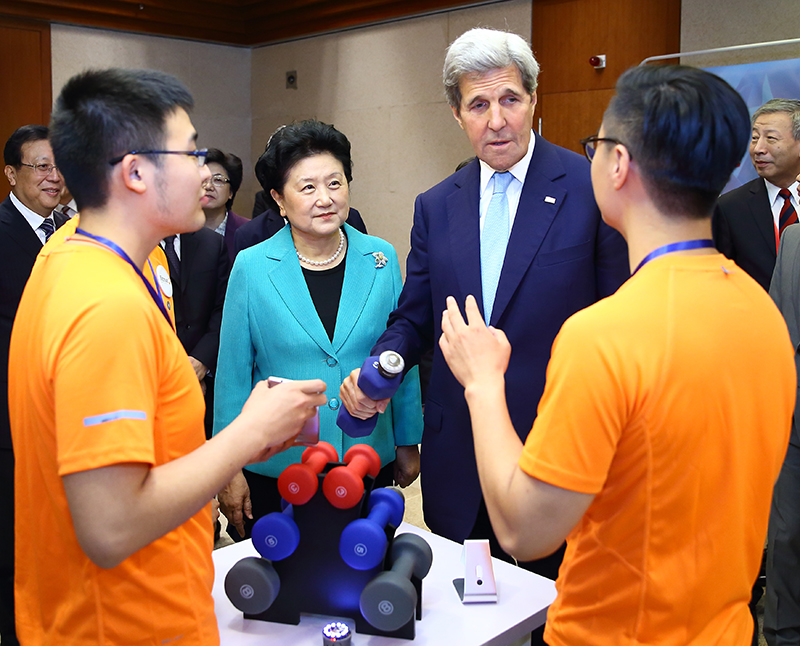Scholars: Total public diplomacy needed

Chinese Vice-Premier Liu Yandong (2nd from left) and US Secretary of State John Kerry (2nd from right) visit the China-US Young Maker Competition on June 7. In service of the seventh Annual China-US High-Level Consultation on People-to-People Exchange, the competition represents an important public diplomacy event for deepening people-to-people exchanges and cooperation between the two sides.
More than 30 scholars from China and the United States gathered at the 2016 China-US Public Diplomacy Summit to call for “all-dimensional” public diplomacy in service of the new model of China-US major-country relations and bilateral cooperation.
Held on June 19 in Beijing, the summit was co-sponsored by the National Academy of Development and Strategy at Renmin University of China and the China Public Diplomacy Association.
Liu Wei, president of Renmin University and director of the academy, said the manner in which China and the United States build a new international political and economic order will definitely affect global economic growth and social stability.
Pointing out the two countries’ intertwined interests and frequent interactions in the Asia-Pacific region, Liu said China and the United States must be the driving force behind cooperation in the region and the world at large through comprehensive, effective public diplomacy, which requires innovative ideas from think tanks and intellectual communities on both sides.
Ma Zhengang, vice-chairman of the association, said that the China-US relationship has suffered setbacks from time to time despite the overall trend of rapid development and the unprecedented breadth, depth and height of bilateral ties in various areas.
Although the two countries have reached consensus on jointly building a new model of major-country relationship, they are sometimes distracted, Ma said, adding that the root cause of the problem is a lack of strategic mutual trust.
During such a period, public diplomacy is needed more than ever to deepen mutual understanding and trust between the two nations, he said.
In recent years, public diplomacy has drawn wide attention from all circles of China. The vigorous participation of higher-learning institutions, think tanks and non-governmental organizations has opened up new prospects for the field in the country.
However, some Americans have a Cold War mentality and only see international relations in terms of hegemony, posing a major challenge for public diplomacy, Ma said.
Although progress is being made in many fields, some structural problems loom large in China-US relations, said David Rank, deputy chief of mission at the US Embassy Beijing, who stressed that public diplomacy experts from both nations should assume more responsibilities to achieve better cooperation in the area.
Li Daoyu, former Chinese ambassador to the United States, called for multi-pronged measures in public diplomacy.
The first priority should be to spread the idea of mutually beneficial cooperation in public diplomacy and intensify related theoretical studies, followed by strengthened collaboration with think tanks of such countries as the United States, to gradually increase China’s international discourse power in the field, Li said.
To tell China stories well, it is necessary to introduce the country’s developments and changes, as well as diplomatic approaches and policies in a fashion acceptable to foreigners, he added.
If economic interdependency is the “ballast” of the China-US relationship, bilateral communication between think tanks is the “early-warning system,” “buffer strip” and “safety value,” said Cheng Li, director of the John L. Thornton China Center at the US-based Brookings Institution. Cooperation between Chinese and American think tanks plays a vital role in avoiding misunderstanding, misinterpretation and misjudgment between the two sides, he said.
As two big countries in the world, China and the United States share integrated interests, said Wang Lili, deputy director of the academy.
“We cannot afford to confront each other. Cooperation is the only way out because the vast space for bilateral cooperation will be more beneficial to global interests,” Wang said. Considering the various uncertainties in international relations, the world needs active cooperation between China and the United States to establish a more strategic, far-sighted relationship, she said.
“Thus, we must, through communication, dialogue and cooperation between strategists of the two nations, provide strategic intellectual support and foster a good opinion environment for the new model of China-US major-country relationship, and finally contribute to the peace and stability of the Asia-Pacific region and the world,” she said.
